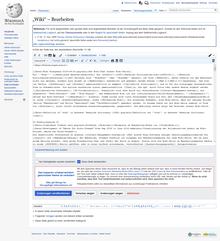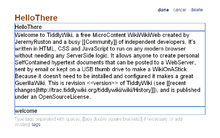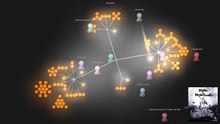Wiki
![]()
The title of this article is ambiguous. For other meanings, see Wiki (disambiguation).
A wiki (Hawaiian for "fast") is a website whose content can not only be read by visitors, but also edited and changed directly in the web browser (Web 2.0 application).
The aim is often to collect experience and knowledge collectively (collective intelligence) and to document it in a form that is understandable for the target group. To this end, the authors work together to create texts, which may be supplemented by photos or other media (collaborative writing, e-collaboration). This is made possible by a simplified content management system, the so-called Wiki software or Wiki engine. Similar to a multidimensional spreadsheet of a spreadsheet, the user interface is divided into a frame including a menu and four pages, two of which can be described and modified in read-write mode (article page and discussion page) and two of which are used in read-only mode for version and comment documentation in batch form.
The best-known wiki is the online encyclopedia Wikipedia, which uses the wiki software MediaWiki. In addition, many companies also use wikis as part of the knowledge management system in their intranet (across locations), see Enterprise Wiki. A single document, a wiki page, can be changed with a few clicks (Edit button and Save or Publish button). For this purpose, the wiki page is usually stored in the form of wikitext, an easy-to-learn markup language.
The figure on the top right shows the wiki text of this wiki page in edit mode.
.png)
Definition of wiki in Andrews' A Dictionary of the Hawaiian Language (1865).

Wikipedia source text (example)

Simple wikitext examples in the edit mode of TiddlyWiki
How it works
As a major difference to other content management systems (CMS), wiki software offers fewer design options for the layout and design of the web pages. The primary function, on the other hand, is an editing mode for each wiki page that allows even a novice to change the text and content of the page without much training. For this purpose, the wiki page in edit mode is often opened in a WYSIWYG editor or displayed in an easy-to-learn, simplified markup language (such as Wikitext) (or optionally both). Both variants usually allow font markup, linking, lists and enumerations in particular, and sometimes also the possibility of transclusions for repetitive content.
In contrast to content management systems with their partly precisely regulated workflows, for example in editorial systems, wikis rely on the philosophy of open access: ideally, every user can read and edit every entry. Wikis are considered to have an advantage over a classic CMS when a large number of users post information so that a critical mass is reached in the medium and it becomes a "self-runner". However, there are also wiki systems that allow access control (e.g. via access control list) for specific pages and user groups (e.g. departments of a company).
An essential feature of most wiki products is version control, which allows users to quickly restore an earlier version of a page in the event of errors or vandalism - which are hardly avoidable due to open access.
As is usual with hypertexts, the individual pages of a Wiki are connected to each other by cross-references (hyperlinks); the title of a page usually also serves as the link address. Links to non-existent pages are then not displayed as errors, but a form appears to create the new page. Networking with other popular wiki services is partly made possible by so-called InterWiki links.
Most systems are released as free software, often under a version of the commonly used GNU General Public License (GPL). Many wiki software systems are modular and offer their own programming interface, which allows users to write their own extensions without knowing all the source code.
A wiki can be publicly available on the World Wide Web, used in local networks only for a specific user group (e.g. as an intranet), or used on a single computer for personal information organization, for example in the form of a desktop wiki. Examples of desktop wiki software include AcroWiki for Palm OS, Tomboy and Zim for Linux, VoodooPad for macOS, Gluebox (platform-independent), ConnectedText and WikidPad for Windows, and TiddlyWiki, which runs client-side (without a server) as JavaScript in any browser. In the case of publicly accessible wikis, there may be restrictions, for example through an obligation to register, so that a user account is associated with further access rights.

Play media file Visualization of the collaborative work on the wiki project "Math for Non-Freaks
History and applications
The development of the wiki as a medium is closely linked to the World Wide Web. It only became a successful model through this, even though its precursors go back to the 1970s. The fact that the pages can be changed by anyone also consistently implements an original idea of the World Wide Web.
In software development, the immense benefits of wikis for effective knowledge management in a collaborative environment were first recognized, presumably due to the employees' affinity for technology. A wiki system can be used in software development, especially for creating documentation, managing software bugs, or coordinating among software developers. For example, the first wikis were developed in the mid-1990s by software designers for product management in IT projects. Wikis play a key role, especially in open source software development projects - such as Apache or OpenOffice.org - where people scattered across continents work together. Today, wikis are used in a wide range of applications where flexibility of content is more important than a representative layout. These include documentation in business, science and culture.
Forerunner
One of the first precursors of the wiki was the ZOG database system developed at Carnegie-Mellon University in 1972, which was designed for multiple users and presented the data in structured text frames; they were connected by hyperlinks.
This system was extended in 1981 by Donald McCracken and Robert Akscyn to become the Knowledge Management System (KMS), in which changes to the data sheets became immediately visible throughout the network. In this system, graphics and images could already be integrated, and they could also be hyperlinked.
Also based on ZOG was Janet Walker's Document Examiner, which was used to display computer manuals from 1985. This hypertext system, in which the texts were displayed in a scrollable screen window, was further developed in the same year by Xerox into the Note Cards system, from which Apple's HyperCard system (initially under the name WildCard) finally emerged in 1987.
This system had a decisive influence on Ward Cunningham's WikiWikiWeb, as it already allowed different types of cards, for example, one group for users, one for projects and one for the ideas themselves. Also, in Cunningham's further development of the system, it was possible to create new cards by clicking on links to non-existing content.
Tim Berners-Lee, who made decisive contributions to HTML and the World Wide Web from 1989 onwards, had pursued similar ideas at the beginning of his work on hypertext systems, since in his opinion this tool should be used primarily for the collaborative creation of texts in the scientific community. Consequently, Berners-Lee's first web browser, WorldWideWeb (1990/1991), was suitable for both displaying and editing websites. He describes his ideas in historical perspective in his book "Weaving The Web" (German loan translation "Der Web-Report"). Nevertheless, the non-collaborative creation of websites initially prevailed on the Web, which was achieved through restrictive user rights for the pages on the servers.
The WikiWikiWeb
The first real wiki hosted on the Web, WikiWikiWeb, was conceived by US software author Ward Cunningham as a knowledge management tool within the framework of design pattern theory in 1994, based on HyperCard systems. It dealt with software design in the context of object-oriented programming. It was made available to the public via the Internet on March 25, 1995.
Cunningham chose the name because, on arrival at the airport on Oʻahu, he had become familiar with the name Wiki Wiki for the express bus there. In doing so, he adopted the doubling, which in Hawaiian stands for an increase ("very fast"). Cunningham continues to regard Wiki as an abbreviation for the actual name WikiWikiWeb.
Cunningham's concept met with lively interest in the software development community, which grew rapidly. Thus, in December 1995, the pages of WikiWikiWeb already comprised 2.4 MB of storage space, by the end of 1997 it was 10 MB and by the end of 2000 62 MB.
Wikis in the late 1990s
Shortly after WikiWikiWeb went live, the first clones of the software were created. Wikis quickly became a popular tool in the free software scene, where they were used as a tool to support communication and the organization of ideas among developers. Cunningham also supported this development by releasing his own clone of his software, called Wiki Base. Nevertheless, tensions soon arose between WikiWikiWeb and some clones, as Cunningham expected Wiki Base users to add their own improvements to the source code of his own wiki, but this rarely happened.
One of the most important clones of Wiki Base was CvWiki, written by Peter Merel in 1997. This gave rise to UseModWiki in 1999, which is still used today in MeatballWiki, one of the most popular software wikis. UseModWiki was also Wikipedia's wiki engine in the early days, until it was replaced by MediaWiki in 2002.
In 1998, TWiki, the first wiki software based on text files, was published. This system is particularly suitable for smaller wikis (e.g. desktop and company wikis), in which higher performance can be achieved in this way. In 1999, PhpWiki was released, the first wiki engine based on the PHP programming language.
Until 2001, wikis as a medium were largely limited to the software developer scene, so public interest in them outside this specialized scene was limited. Nevertheless, collaborative web portals with similar goals, such as Everything2, had already been developed using other software concepts. The first real wiki portal developed on a topic other than software was the online travel guide World66, founded in 1999 by a Dutch company that was one of the first to try to integrate the concept of free content into a profitable business model.
Between 1998 and 2000, tensions arose in the WikiWikiWeb itself as contributions moved further and further away from the original subject of the wiki. Thus, a confrontation between two groups occurred: While the WikiReductionists wanted the focus of the wiki to remain on object-oriented software programming, the WikiConstructionists felt that there should be room for other, more general topics in the WikiWikiWeb, especially those related to the wiki concept as such (so-called WikiOnWiki topics). This led to a split in 2000 and the creation of the MeatballWiki, which, in addition to discussing the wiki idea itself, also dealt with more general topics such as copyright law or the cyberpunk movement. The MeatballWiki and several other sites created in this dispute were designated SisterSites and linked directly from the WikiWikiWeb. From this wiki came many ideas to promote the popularization of the wiki idea, such as the TourBusStop, a tour of different wikis, the WikiNode as a hub of a wiki, and the WikiIndex as a database of as many wikis as possible.
Wikipedia and the popularization of the concept: 2001 to 2005
The popularization of the wiki concept goes back to the online encyclopedia Wikipedia. Between 1999 and 2000, the US company Bomis had developed the idea of an encyclopedia created on the Internet. However, the Nupedia project, which was launched in 2000, was initially unsuccessful because the process of creating entries was based on the peer review process and was therefore very lengthy. Towards the end of the year, therefore, a wiki extension was developed by Bomis founder Jimmy Wales and Larry Sanger, hired by Wales, which went online on January 15, 2001, on the separate domain wikipedia.com, and became a great success later that year, especially after a story in the online magazine Slashdot. Other language versions were launched that same year. By 2005, the number of pages had grown to over one million and Wikipedia had become one of the most visited websites ever.
In order to meet the growing demands of Wikipedia, the MediaWiki software was developed in 2002. It introduced as an innovation that the links could receive free text for the first time, before that the so-called CamelCase notation was common, in which the words were not separated by spaces. MediaWiki was especially designed for scalability in order to cope with the rapidly increasing number of users.
In the following years, new wikibased web portals were founded, partly from within the Wikipedia community, but also partly from within the Meatball community. These included Enciclopedia Libre, a fork of the Spanish-language Wikipedia founded as early as 2002, Susning.nu, a Swedish-language mixture of encyclopedia and web forum, the online travel guide Wikitravel founded in 2003, the SourceWatch project for documenting lobby organizations, and the wikis Wikinews, Wiktionary, Wikibooks, Wikisource, Wikiquote, and Wikispecies, which were designated as sister projects of Wikipedia. The wiki concept has thus been adapted to different types of texts, with varying degrees of success. A first notable variation of the Wikipedia concept was developed starting in 2003 with Wikinfo, in which different perspectives on various topics were allowed; however, its success fell well short of that of Wikipedia.
Commercial wiki farms, which often offer their services free of charge, gradually led to the existence of a dedicated wiki on almost every possible topic. A particularly great success became the so-called Fanwikis, which - in addition to the lexical treatise - enabled a new form of collaboratively created fan fiction. Particularly in the science fiction (e.g. Memory Alpha), fantasy and comic areas, some wikis were able to achieve high numbers of articles and participants. Wikis such as Uncyclopedia, Stupidedia and Kamelopedia have also established themselves in the field of humour.
Wikis as mass media: development since 2005
The success of Wikipedia led to various efforts to improve the wiki concept. In the area of wikis conceived as encyclopedias, Ulrich Fuchs and Larry Sanger independently developed the Wikiweise and Citizendium projects, in which the wiki concept is restricted and instead an increase in quality is to be achieved through a system oriented more closely to traditional editorial work. In Citizendium, for example, each article has its own responsible maintainer, who is known by his or her real name. However, both projects have so far failed to achieve resounding success.
Another development is the expansion of traditional web portals of various kinds with wiki functions. In the knowledge portal Google Knol, for example, anyone interested can post texts and decide whether or not to release their content for collaborative wiki-style editing. The scientific wiki Scholarpedia is based on a similar concept, but is limited to a few special topics and severely restricts the participation of non-specialists.
Wiki-based computer-generated databases have continued to be created since about 2005, which can be edited and thus improved by web users. These wikis are usually highly structured and make extensive use of templates. Well-known representatives of this wiki form are the web directory AboutUs.org, the open directory project extension Chainki and the proprietary music database CDWiki. Wikis have even been used to market Internet advertising, as with WikiFox (now discontinued) and ShoppiWiki.
Through software enhancements, the wiki concept has been expanded to include the display of content popular as of 2005, such as web videos, as well as prepared for future anticipated Internet phenomena such as the Semantic Web.
In March 2007, the word wiki was added to the Oxford English Dictionary.
A number of Regiowikis have been set up specifically for individual cities and their subject areas. The largest in the world was for a long time the Stadtwiki Karlsruhe.
Wikis in organizations: Development from 2007
Company wikis
Spurred on by the success of Wikipedia, many companies have begun to set up company wikis in order to collect the knowledge of their employees within the company and make it transparent (knowledge management). Here, the commitment of the employees may be indispensable. On the other hand, the financial outlay is usually lower than for conventional systems of knowledge preservation. The use of wikis tends to be more promising with flat hierarchies and in a corporate culture that is as open as possible.
Dissemination of enterprise wikis
In 2008, for example, 41% of the Finnish top 50 companies used or tested wikis, and another 18% were open to using wikis.
According to a study by Forrester Research, the use of enterprise wikis in the context of Enterprise 2.0 will increase approximately tenfold from 2007 to 2013. The consulting firm Gartner estimated that about half of the companies will have installed a wiki in 2009.
Classification of enterprise wikis
Basically, corporate wikis can be divided into two groups:
- Company or departmental wikis attempt to capture the knowledge of a company or department.
- Project-related wikis, on the other hand, are specifically tailored to a single project. Like the associated projects, they often only have a limited lifespan and are often only intended to be accessible to a specific group of people.
Some wikis combine both types and allow the creation of so-called spaces to separate projects from each other in terms of content and user rights.
Wikis in the education sector
In the meantime, many schools and universities use their own wikis. In 2010, there were WikiWebs at more than 34 % of all universities in Germany.
Wiki of the history of technology
The world's largest technical professional society, the Institute of Electrical and Electronics Engineers (IEEE), with a focus on electrical engineering and computer science, founded a sub-organization called the IEEE Global History Network in 2008. It created a wiki-based, English-language, freely accessible online database of historical content on the history of technology in these fields. This includes milestones of development as well as oral and written personal accounts of experiences. In 2015, the IEEE Global History Network was incorporated into the broader Engineering and Technology History Wiki organization of the major U.S. engineering professional societies, where it will continue.
Wikis as political instruments: development since 2007
In Austria, following the adoption of the government programme of the grand coalition between the SPÖ and the ÖVP in 2007, a website was set up by the parliamentary group of the Greens to reformulate the government programme in terms of civil society. The party promises to take the suggestions formulated therein into account should it enter into government negotiations.
On 11 July 2009, the Institute for Portuguese Democracy (IDP) launched the Constituição 2.0 project in Portugal. The aim is to create a new Portuguese constitution, modelled on Wikipedia, which will be created collectively using the Wiki system.
An article in the Israeli daily Haaretz takes up the idea as a possibility for the creation of a constitution of Israel.

Wiki Wiki Bus at Honolulu Airport

Ward Cunningham, inventor of the Wiki
Questions and Answers
Q: What is a wiki?
A: A wiki is a type of website that allows anyone who can access it to create and change its pages. It is often used as an abbreviation for Wikipedia.
Q: What does "wiki" mean?
A: Wiki is short for WikiWikiWeb, which comes from the Hawaiian language and means "fast" or "speed".
Q: What are some examples of wikis?
A: Examples of wikis include Wikipedia, Everipedia, Citizendium, Scholarpedia Conservapedia, Wiktionary and Wikibooks.
Q: Who can edit a wiki?
A: Anyone who has an account on the wiki or everyone in the world if the wiki allows it can edit a wiki. Some important pages may only be changed by certain users.
Q: How do people use wikis?
A: People use wikis to share information with each other by writing pages collaboratively and discussing topics to help understand things better and express their views.
Q: What software is most commonly used for wikis?
A: MediaWiki is the most used software for wikis and it is used for Wikipedia as well as many other Wikis. JSPWiki is one of many others.
Q: Who started the first wiki?
A: Ward Cunningham started the first wiki in March 1995.
Search within the encyclopedia